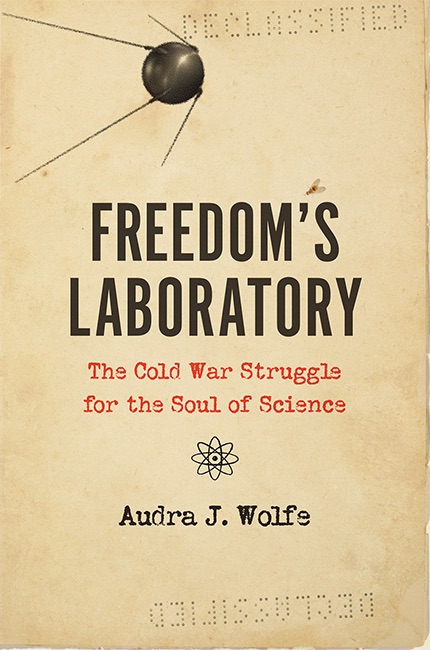For some dedicated ideologues, everything is political, from voting to ordering a cup of coffee. While that’s obviously an extreme point of view, it’s undeniable that politics affects a wide range of human endeavors. Science has generally been held up as one area that’s objective and dispassionate, free of the taint of political bias and ideological agendas, an enterprise joining all humanity in a single purpose without borders.

BOOK REVIEW — “Freedom’s Laboratory: The Cold War Struggle for the Soul of Science,” by Audra J. Wolfe (Johns Hopkins University Press, 320 pages).
As with most lofty ideals, of course, the reality is considerably different. Newton’s laws of motion or Einstein’s special relativity may be apolitical in their essence, but because their interpretation and application are inevitably subject to human emotion and opinions, we have artillery shells and atomic bombs. Anyone who labors under the belief that science can operate completely free of political influence need only ask any of the thousands of scientists whose work was crippled and livelihoods threatened by the recent shutdown of the federal government.
As the historian Audra J. Wolfe demonstrates in her book “Freedom’s Laboratory: The Cold War Struggle for the Soul of Science,” the entanglement of science and politics becomes especially troublesome in times of great turmoil. While there’s plenty of scholarly work about scientists co-opted by the government and military to build weapons, Wolfe examines the far more obscure history of how scientists participated — sometimes unwittingly, sometimes knowingly — in the quieter psychological warfare and propaganda campaigns against the communist world that shaped Cold War diplomatic policy and cultural interactions.
Wolfe begins with the infamous Lysenko era in the USSR, in which Trofim Lysenko, an agronomist, rejected the scientifically accepted concepts of the gene, Mendelian inheritance, and even Darwinian evolution. Because his pseudoscientific notions happened to coincide with the policies of Stalin and other Soviet authorities, Lysenko’s version of genetics became the official party line. Much to the horror of Western scientists, Soviet biologists who refused to go along with Lysenko’s twisted science were ostracized, persecuted, and sometimes even executed.
When some scientists such as the geneticist H. J. Muller tried to organize their colleagues against Lysenkoism, U.S. government authorities detected the makings of a valuable propaganda weapon. After all, wasn’t scientific freedom as much a core American value as free speech or religious choice? Here was a linchpin that could be used to demonstrate the superiority of Western culture over the authoritarian darkness of Soviet society. Even better, it could be done both openly, through international conferences, cultural exchange programs, and educational projects that promoted the Western virtues of free, fact-based, apolitical science, and clandestinely, notably by using supposed “scientific attachés” to collect intelligence and cultivate contacts with Soviet scientists (who would presumably return to the USSR to subtly influence their colleagues to embrace the Western ideals of open inquiry).
Wolfe traces various such episodes, from the mostly failed “scientific attaché” idea to the considerably more successful CIA backing of international scientific and cultural organizations such as the Congress for Cultural Freedom (CCF) and the Asia Foundation. While many such organizations weren’t mainly scientific in nature, scientists participated in their conferences, wrote for their newsletters and even helped to run them — often unaware that the people holding the purse strings may have had other motives beyond the promotion of free and open scientific discourse. For Cold Warriors such as the CIA covert action chief Frank Wisner, such activities provided a way to counter the Cominform, the Soviet Union’s highly sophisticated international propaganda campaign network. “Science entered U.S. psychological warfare programs as a stowaway…’’ writes Wolfe. “More subtext than text, ideas about science subtly undergirded policymakers’ emerging plans for waging and winning this new kind of war.”
The scientific ideals of free inquiry and open discussion dovetailed nicely with the democratic ideals that America’s psychological warriors were working to promote.
It’s a complex and sometimes murky story, complicated by the fact that a lack of organization and sometimes open conflict between the various parties involved tended to diffuse any coordinated propaganda offensive. For example, in the anti-communist tenor of the times, some U.S. government officials were suspicious of American scientists associating with foreign communist counterparts, and restrictive laws such as the 1950 McCarran Act severely impeded the travel of both U.S. citizens and communist foreigners; meanwhile, other government agencies were trying to encourage such activity.
By the late 1950s and early 1960s, some scientists such as the Nobel Prize winner Linus Pauling abandoned any pretense of being apolitical, actively campaigning internationally for causes such as the quest for a nuclear test ban treaty, using their professional credentials to lend credibility to their positions on science-based controversies. That also allowed officially independent organizations of scientists, such as the disarmament group Pugwash, to become involved in behind-the-scenes diplomatic efforts to negotiate the Limited Test Ban Treaty of 1963, with their technical expertise allowing “a reliable backchannel for diplomats and intelligence officers in both the United States and the Soviet Union.”
Still, Wolfe notes, “scientific neutrality nevertheless remained a key value of U.S. cultural diplomacy through most of the Cold War” — even if that neutrality was sometimes more “aspirational” than actual.
By the end of 1967, the CIA’s role in financially supporting and sometimes influencing organizations such as the CCF had been publicly exposed — “the CIA was officially out of the hearts-and-minds game” — but scientific diplomacy and political activities by scientists went on, spurred greatly by the increasing prominence of high-profile political dissidents in the USSR such as the physicist Andrei Sakharov.
The fact that so many Soviet dissidents also happened to be scientists encouraged the political activism of many Western scientists, some formerly apolitical and some who were already politically active. “U.S. scientists in the 1970s confronted the problem of Soviet scientists’ freedoms, and scientific freedom, with a deeper political sophistication than they had two decades earlier,” says Wolfe. That sophistication, along with a renewed official emphasis on human rights under the administration of Jimmy Carter, made scientists’ political efforts more visible and effective.
It also helped that, by this time, the Western ideal of a universal, objective science had essentially triumphed over ideologically based Soviet pseudo-science: “By 1980, there was only one ‘science,’ and it looked remarkably like the vision advanced by the West.”
Wolfe observes that Sakharov’s “peculiar success” as a dissident and human rights icon “drew in large part from attitudes about scientific freedom that circulated as part of the U.S. ideological offensive during the Cold War. In this small but important way, cultural diplomacy involving science contributed to the eventual downfall of the Soviet Union.”
Scientists may still believe they should remain neutral and apolitical, concentrating on eternal verities and the hard facts of experimental data. It’s clear, however, that Wolfe believes otherwise, whether science is being challenged by the ideology of a foreign rival, as in the Cold War, or by the policies of one’s own government, as many Americans fear in the current U.S. administration. “As a historian of science and the Cold War, it’s impossible for me not to hear echoes of Trofim Lysenko’s power grab in the Trump administration’s attitude toward science,” she writes.
Ultimately, “unlike most of the United States’ other attempts to destroy communism through culture, science diplomacy worked,” she writes. Perhaps paradoxically, the idea of “apolitical science could triumph only through scientists’ embrace of politics.” Maybe not quite everything that human beings do is political, but science seems to be one human activity that’s far too important to remain completely untouched by political concerns.
Mark Wolverton is a science writer, author, and playwright whose articles have appeared in Undark, Wired, Scientific American, Popular Science, Air & Space Smithsonian, and American Heritage, among other publications. His latest book “Burning the Sky: Operation Argus and the Untold Story of the Cold War Nuclear Tests in Outer Space” was published in November.











Comments are automatically closed one year after article publication. Archived comments are below.
Face it, “science” is used to promote propaganda in the U.S., too.
An enmity toward accepting the presence of God, for example, is commonplace among the machinations of the Democratic Rackets. “Science”, for example, conveniently declares that all acceptance of the presence of God is based on “coincidences” and they define “coincidences” as happening constantly. But they carefully avoid mentioning that there are types of coincidences. Seeing two telephone numbers, one after the other, beginning in “2”, in a regular course of events is a coincidence. Forgiving someone who dislikes you, for the first time ever, simply because it eases conditions for yourself and the other, then finding $15.00 in a wad on bills on the sidewalk five minutes later can be called coincidental in nature, but its it? The significance, the unlikeliness make it utterly unlike seeing two people standing together having red hair. But “science” shills don’t mention that.
Those who push “vaccines” insist they must be safe. They describe the way authentic vaccines are supposed to be made, using only denatured cells of pathogens, then order people to believe they are still being made that way. They claim vaccines helped people in the past, then demand that people believe that means they still are. They claim the same number of people get “autism” from vaccines today as unvaccinated people, but “science” has defined “autism” as a spectrum, from severe to manifestations that can be said not even to exist. They don’t try to compare the degrees of “autism” they claim vaccinated and unvaccinated people get. They won’t mention what other additives are placed in “vaccines” today, they order people to ignore that fact. It could just as well be a machination to try to control outbreaks from hundreds of diseases brought in by illegal aliens without admitting they are bringing in diseases, and that would be a political move.
Democratic Rackets members promote the idea of climate change from “fossil fuels”. To begin with, only weather is changing, land forms, seas, solar radiation, life are not changing the weather. Climate is not changing. The effects on the weather can be caused by doping the air with weather modification chemical from high flying jets, causing non dissipating vapor lanes that stretch from horizon to horizon and can last for hours, what are called “chemtrails”. But they refuse ever to address the issue of chemtrails. They won’t even talk about them! They declare it “settled science” that “fossil fuels” cause the change in the weather. The fact is, there are climatologists who dispute that. Shills for “science” and the Democratic Rackets insist that, if only a few feel one way, that way must be wrong. Then they go and praise Galileo for saying the earth orbited the sun when everyone else disagreed.
Consider the invalid and depraved methods “scientists” use to promote their favored propaganda. “Arguments” such as Carl Sagan’s, “Extraordinary claims require extraordinary proof”. But what constitutes “extraordinary”? There is no definition for the term in the sciences! To deny legitimate claims they didn’t want to accept, so many unscrupulous have declared claims necessarily “extraordinary”, without a meaning for “extraordinary”, then insisted that no proofs were “extraordinary” enough. The claim that “micro comets”, only the size of refrigerators, enter the earth’s atmosphere regularly was “discredited” in this way.
In the same way, Christopher Hitchens’ credo which essentially says, “If one person makes a claim and another declares it untrue, the first person and the first person alone has the obligation to prove what they say and, if they provide no proof or evidence, then their claim is necessarily untrue and the opposite assertion is automatically true. This is used by unscrupulous “scientists” and “science” devotees to try to deny the presence of God. But not providing evidence of something does not mean it doesn’t exist! Fermat’s Last Theorem had no proof provided, but that didn’t keep mathematicians from searching for a proof and they evidently found one.
So much in society is declared based on philosophy, but so few realize that what is taken for “universal truths” today is nothing more than propaganda that serves Democratic Rackets agendas. Such as that everyone necessarily is absolutely equal in all characteristics. Such as that all members of entire groups cannot possibly all have the same characteristics. Such as that whites are to fault for all the misery in the world. Such as that “democracy” solves all problems. Such as that it is impossible that conspiracies with more than a few people cannot exist. They insist that a “free press” is essential for “democracy”, conveniently ordering that people believe that members of the “press” never lie, never promote propaganda. The same for “science”.
Even religion had been using “science” as a propaganda tool. The dogma that the earth is being the center of the universe and having the sun orbiting it has been (and is still, at least among flat-earthers) argumented to strengthen the doctrine that us humans are God’s “crown of creation”. The dogma that everything exists only as opposite pairs –and that God creates no homosexual animal– is still a powerful tool in scaring some of us to “keep making babies until the earth is full of them while letting God alone worry on how to feed their mouths”, since, naturally which communistic ideology won’t be happy to ensure its continued earthly existence by having more adherents (especially from births when conversion gets more challenging)? And the refusal of Abrahamic religions to acknowledge reincarnation can be attributed to their fear that people will not worship God “like there’s no tomorrow” while being aware that they will keep coming back to earth (or some other pre-eternity plane of existence).
Indeed, it cannot be denied that while facts do not take side and have no political orientation, science (as a way of packaging and presenting facts) can be steered towards achieving certain political acquirables. It is simply logical that individually, all sane humans do politics, including but not limited to religious people who are actually seeking to secure their piece of land in a heaven –along with eternity in it– in their “apparently-selfless” humanitarian acts done in the name and for the promotion of their communistic ideology and its deity.
Another take on the politicization of science; the refusal of the Food and Drug Administration to encourage (much less self-conduct) researches on the efficacy of herbal medicine is needed to maintain certain circular reasoning that alternative healing methods are “not well researched” and thus less reliable than the products of the trillion-dollar investments from pharmaceutical industries. It shouldn’t even be surprising that with enough amount of money one can invent a ^scientific research^ proving that herbal medications and food supplements “do not work” –just as “evidences” can be planted to disprove global warming. But take a look at the peak of Jaya Wijaya in Papua Island, Indonesia. This mountaintop is now about to lose all of its initially-wide (Southeast Asia’s only) snowy landscape (from just last decade). What’s beneath the mountain? A gold-mining operation from a US-owned corporation; the Freeport.
Global Warming is definitely happening and no matter how small the degrees are, human activities contribute to it. But overpopulation (uncontrolled births) is a far graver threat to humanity’s sustained existence on this planet. This is a unique issue where capitalism and religion both benefit from the same status quo. Capitalism is happy when under-educated, non-skilled (and thus, cheap) labors are abundantly available, while religion –with its politics to ever-expand and self-sustain as a communistic ideology– will never consider limiting the births of “our deity’s most potential worshipers”. When the Pope visited Philippines some time ago, there was a concerted effort from the government to hide Manila’s urban poor in making the city tour to be less “visually-inconvenient”. Is that not ironic when these under-educated and less privileged people keep sh*tt*ng babies because of what the church teaches and preaches them (in addition to barring access to birth control methods via its heavy governmental influence)?
Now to address your issue with “God’s presence not acknowledged enough by Democrats in public spaces”, please kindly acknowledge that some of these Democrats are people of faith (albeit moderate and/or liberal ones) who are in fact trying to save their religion (and deity) from being exposed for its inhumanities and illogicalities. Naturally if you want to use public spaces to promote your religion (or technically; to advertise some verses you cherry-picked from the scrapture to arrive at certain pre-conclusions and justify certain prejudices while conveniently ignoring its contradicting and refuting ones), then you will also have to tolerate having your doctrines publicly examined, scrutinized and debunked by atheists; people of other faiths, and even your fellow Christians who follow other (opposing) doctrines/ denominations. Or do you understand “religious freedom” to apply only to the propagation of your own faith?
Now to get this abstraction into perspective, are you sure you want far more people to be knowledgeable on the following truths?
Scientifically, how can an all-knowing creator of all…
1. Denies evolution while plagiarizing an ancient myth on creation from a paganistic religion of ancient Sumeria? Search for “Sumerian Temptation Tablet” to see the picture of a relic proving this, and reach the book Genes, Giants, Monsters and Men (Joseph P. Farrell) to review Vatican’s history in suppressing some “inconvenient” archaeological findings.
2. Recycles the Epic of Gilgamesh as the Story of Noah’s Ark while claiming that it actually took place? Review the article The Impossible Voyage of Noah’s Ark in the National Center for Science and Education (NCSE) website to learn how and why this story alone was reason enough for some to denounce their Christianity.
3. Claims the earth is flat, being the center of the universe, and having the stars (including the sun) orbiting it?
Philosophically, how can God gives us ^free will^ when the Bible itself testifies (naturally in verses most Christians wish to never be part of it –like plagiarized myths of creation, global deluge & flat earth) that God is an almighty for (ironically) also predetermining whether or not we will be faithful to It (for whatever logic or lack of it)?
Should it be unnatural for an all-knowing creator of all to also have dominion and complete power over “unpleasant & inconvenient” things as Romans 8:28 testifies? Don’t people who brag their joy of being ^saved^ by Christ must believe first that they were “lost”? Reach the article “Satan Always Asks Permission Seven Ways God Reigns over Evil” in the Desiring God dot-org website; Satan works for God in 3 ways: testing faiths; taking what God no longer wants one to have (Job 1:21); and scaring people into believing in “Light”. Satan was made cunning (Gen 3:1); can’t harm without permission (Job 1: 9, 11,12) and takes direct orders from Hesus (Mark 1:27). Now for these Satan will burn in hell for rest of eternity?
And ethically, this issue nicely puts into proper perspective the verses compiled in the book Drunk with Blood: God’s Killings in the Bible (Steve Wells). Since some adherents of Christianism accuse the Prophet of Islamism to be a Bible-plagiarizer, they can now make a Bible-educated guess from where he learned that his deity is supposedly a demandingly-jealous, worship-obsessed, loving-in-condition, deceitful and vengeful deity.
As a former-Muslim atheist, I do not “fear” religion and God. In fact I am not aware of any word-choice to use in expressing my excitement and delight in debating on religion and God. The more public discourses there are about this communistic ideology and its deity, the sooner both will be exposed and the earlier humanity will be released from them. The time has come that our humanitarian deeds are done solely because of our humanity –and not because of “paying the installments for buying that piece of land in a non-existing heaven”.
It is not the use of logic that troubles the people of religions, it is their honesty and consistency in using it.